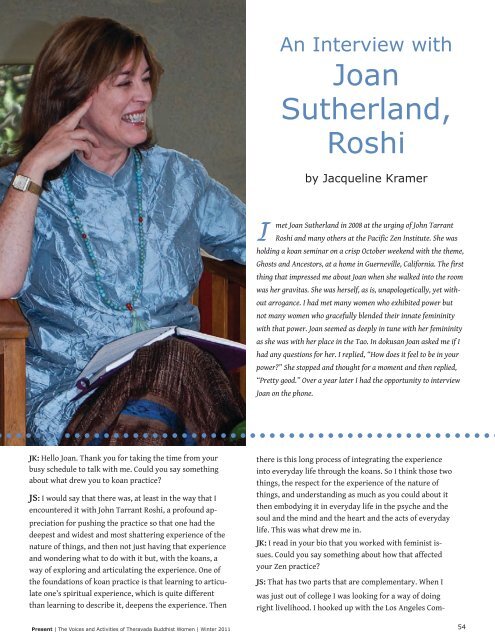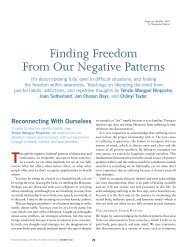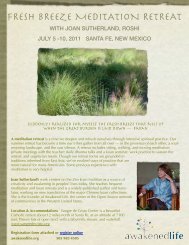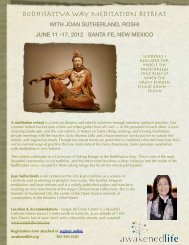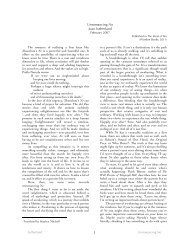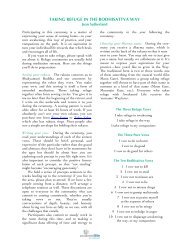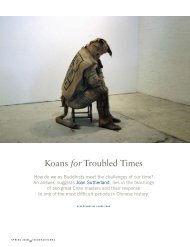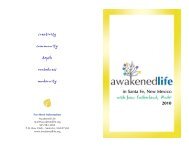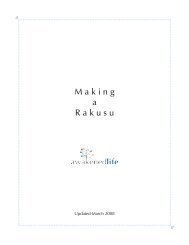An Interview with Joan Sutherland, Roshi - Awakened Life
An Interview with Joan Sutherland, Roshi - Awakened Life
An Interview with Joan Sutherland, Roshi - Awakened Life
You also want an ePaper? Increase the reach of your titles
YUMPU automatically turns print PDFs into web optimized ePapers that Google loves.
<strong>An</strong> <strong>Interview</strong> <strong>with</strong><br />
<strong>Joan</strong><br />
<strong>Sutherland</strong>,<br />
<strong>Roshi</strong><br />
by Jacqueline Kramer<br />
I<br />
met <strong>Joan</strong> <strong>Sutherland</strong> in 2008 at the urging of John Tarrant<br />
<strong>Roshi</strong> and many others at the Pacific Zen Institute. She was<br />
holding a koan seminar on a crisp October weekend <strong>with</strong> the theme,<br />
Ghosts and <strong>An</strong>cestors, at a home in Guerneville, California. The first<br />
thing that impressed me about <strong>Joan</strong> when she walked into the room<br />
was her gravitas. She was herself, as is, unapologetically, yet <strong>with</strong>out<br />
arrogance. I had met many women who exhibited power but<br />
not many women who gracefully blended their innate femininity<br />
<strong>with</strong> that power. <strong>Joan</strong> seemed as deeply in tune <strong>with</strong> her femininity<br />
as she was <strong>with</strong> her place in the Tao. In dokusan <strong>Joan</strong> asked me if I<br />
had any questions for her. I replied, “How does it feel to be in your<br />
power?” She stopped and thought for a moment and then replied,<br />
“Pretty good.” Over a year later I had the opportunity to interview<br />
<strong>Joan</strong> on the phone.<br />
JK: Hello <strong>Joan</strong>. Thank you for taking the time from your<br />
busy schedule to talk <strong>with</strong> me. Could you say something<br />
about what drew you to koan practice?<br />
JS: I would say that there was, at least in the way that I<br />
encountered it <strong>with</strong> John Tarrant <strong>Roshi</strong>, a profound appreciation<br />
for pushing the practice so that one had the<br />
deepest and widest and most shattering experience of the<br />
nature of things, and then not just having that experience<br />
and wondering what to do <strong>with</strong> it but, <strong>with</strong> the koans, a<br />
way of exploring and articulating the experience. One of<br />
the foundations of koan practice is that learning to articulate<br />
one’s spiritual experience, which is quite different<br />
than learning to describe it, deepens the experience. Then<br />
there is this long process of integrating the experience<br />
into everyday life through the koans. So I think those two<br />
things, the respect for the experience of the nature of<br />
things, and understanding as much as you could about it<br />
then embodying it in everyday life in the psyche and the<br />
soul and the mind and the heart and the acts of everyday<br />
life. This was what drew me in.<br />
JK: I read in your bio that you worked <strong>with</strong> feminist issues.<br />
Could you say something about how that affected<br />
your Zen practice?<br />
JS: That has two parts that are complementary. When I<br />
was just out of college I was looking for a way of doing<br />
right livelihood. I hooked up <strong>with</strong> the Los <strong>An</strong>geles Com-<br />
Present | The Voices and Activities of Theravada Buddhist Women | Winter 2011 54


